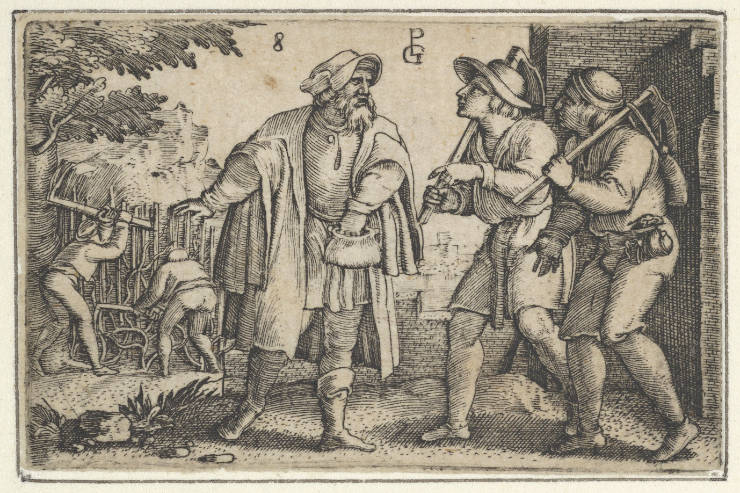More than Words are Needed
by Deacon Michael Bickerstaff | September 27, 2020 12:04 am
 [1]
[1]“The Parable of the Father and His Two Sons in the Vineyard” by Georg Pencz [CC0[2]], via Wikimedia Commons[3]
A Faith Disconnected from Life
I hope and pray that each of us who read these pages desires to deepen our love of God, improve our prayer life and grow in our relationship with the Lord. But too often we tend to separate our faith from our daily life and this prevents the growth we seek.
The Second Vatican Council identified this disconnect between the faith we profess and the life we live as one of the grave errors of our time.
This disconnect between faith and life can take two forms. On the one hand, some practice their faith only when they are at Sunday Mass or other church-related occasion. On the other side, some focus so exclusively on heaven that they neglect their duties and responsibilities in this world.
We have been placed in this life and this world—a place of pilgrimage through which we travel—for a reason. It is our place of formation where we seek, by God’s grace, to become perfected in love. So instead of separating faith from life, we should integrate our faith into all parts of life, allowing the Lord to guide us in all the ordinary moments of daily living.
In our Gospel today, Matthew recalls an encounter Jesus had with the elders and chief priests near the end of his three years of public ministry. He tells them a parable of a man and his two sons.
To understand this encounter, we need to remember how Jesus, when he first began his ministry, would encounter people, many of whom were suffering, as he moved through the streets and villages bringing the good news. He forgave sins and healed the sick and lame. Now, nearly three years later, he no longer simply encountered people as if by chance; he drew great crowds to himself. The religious leaders felt threatened and concluded that Jesus must be eliminated—killed, if necessary.
Just before the passage from today’s Gospel, the chief priests and elders attempted to trip Jesus up. They challenged him, “by what authority are you doing these things, and who gave you this authority?” In response, Jesus offered this parable to them and the meaning should have been clear.
The first son who first said he would not go into the vineyard, but ended up doing the right thing, is like those whom Jesus healed and forgave. The second son who told his father he would work in the vineyard as asked, but did not do so, is like the chief priests and elders.
The Necessity of Humility and Obedience
The religious leaders were just too prideful and blind to understand and learn from the parable. They feared losing their power and position.
Each of us who desire to follow Jesus must guard against this pride. It is a constant struggle, even if we do not realize it. It is the most likely cause of this disconnect between faith and life.
All the great saints, particularly the Doctors of the Church whose expertise is in the spiritual life, teach of the necessity of humility and obedience in the life of the Christian. This would include St. Teresa of Avila, St. John of the Cross, St. Catherine of Siena, St. Thérèse de Lisieux, St. Bernard of Clairvaux, and St. Francis de Sales, among others.
Humility and obedience are the necessary virtues to advance in prayer and grow more deeply in love with the Lord as we allow Him to transform us in the inner person. We must be open to allowing God to direct and shape our lives.
Jesus shows us the way to live
Jesus, the Second Person of the Blessed Trinity and the Incarnate God, is always our perfect model for living.
St. Paul exhorts us in Philippians 2 to live a life of humility toward others, leaving behind all selfishness and conceit. He holds up Jesus as the perfect example who, although He is God, voluntarily emptied Himself of all reliance on His Divinity, becoming like us in all ways but sin. Jesus was obedient to the Father, willing to die for love of us, even a death on the cross.
His life exemplified humility—born of low estate in a stable, driven from his country as an infant, nailed to a Roman cross. In the Holy Week of this encounter, he would wash the feet of his apostles.
The virtue of humility is so important that St. Teresa of Avila stresses that we must spend much time—not days, but a lifetime—practicing the virtue. It is the necessary human action, aided by God’s grace, to integrate our Catholic Faith into daily living.
Into the deep…
Reflection on the Mass readings for the Twenty-Sixth Sunday in Ordinary Time (Year A) — Ezekiel 18:25-28; Psalms 25:4-5, 6-7, 8-9; Philippians 2:1-11 or 2:1-5; Matthew 21:28-32[4].
Deacon Bickerstaff is available to speak at your parish or event. Be sure to check out his Speaker Page[5] to learn more. Into the Deep is a regular feature of the The Integrated Catholic Life™.
Come and Join me on Twitter!
 [6] Help spread the Gospel. Please share on Facebook and other social media.
[6] Help spread the Gospel. Please share on Facebook and other social media.
- [Image]: https://www.integratedcatholiclife.org/wp-content/uploads/the-parable-of-the-father-and-his-two-sons-in-the-vineyard-georg-pencz-web-featured-w740x493.jpg
- CC0: http://creativecommons.org/publicdomain/zero/1.0/deed.en
- via Wikimedia Commons: https://commons.wikimedia.org/wiki/File%3AThe_Parable_of_the_Father_and_His_Two_Sons_in_the_Vineyard%2C_from_The_Story_of_Christ_MET_DP855487.jpg
- Ezekiel 18:25-28; Psalms 25:4-5, 6-7, 8-9; Philippians 2:1-11 or 2:1-5; Matthew 21:28-32: https://bible.usccb.org/bible/readings/092720.cfm
- Speaker Page: http://www.integratedcatholiclife.org/integrated-catholic-life-speakers-bureau/deacon-mike-bickerstaff/
- [Image]: http://www.integratedcatholiclife.org/donate/
Source URL: https://integratedcatholiclife.org/2020/09/deacon-bickerstaff-more-than-words-are-needed/